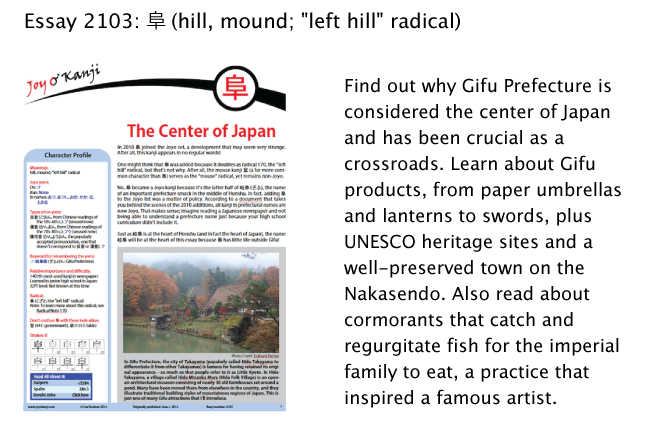Upending Expectations
Let's start with a quiz that involves some of the simplest kanji around. Match the options, ignoring one lettered definition:
| 1. 小耳 (こみみ) | a. eating up |
| 2. 小腹 (こばら) | b. a little hungry |
| 3. 小口 (こぐち) | c. gossiping |
| 4. 大口 (おおくち) | d. overhearing (something) |
| 5. 平らげること (たいらげること) | e. small amount |
| f. large amount |
I'll block the answers with a preview of the newest essay:

You may find that the answers upend your expectations. At least I hope so, or else I designed the quiz badly!
1.d. 小耳 (こみみ: little + ear) means "overhearing (something)." The breakdown doesn't really make sense to native English speakers or even to the Japanese. Perhaps it's more logical to think of it as "a bit of hearing (something)," which is to say "overhearing a little (something)." This word appears in the following term, which Essay 1165 on 挟 (to hold between; insert; be caught in) explores:
小耳に挟む (こみみにはさむ: to happen to hear; overhear)
little + ear + to hear or overhear
2.b. 小腹 (こばら: bit + stomach) means "a little hungry." As with 小耳, the 小 here means "a touch of." So is 小腹 "a touch of stomach"? Not exactly. Just as we had to maneuver around the usual interpretation of 耳, perceiving it not as "ear" but as the function of the ear (namely, "overhearing"), we can understand 小腹 as "a little hungry." Actually, in order to convey that more fully and logically, we need to add a verb:
小腹が空いた。
I'm a bit hungry.
空く (すく: to feel empty, feel hungry)
3.e. 小口 (こぐち) means "small amount."
4.f. 大口 (おおくち) means "large amount."
It's natural to break these words down as small + mouth and big + mouth respectively, but 口 in each case means "kind, type." You can use these compounds to refer to a 契約 (けいやく: contract) as follows:
小口の契約 (small contract)
大口の契約 (large contract)
However, those examples don't bring this aspect of 口 to life as much as the next term from essay 1681 on 濃 (concentrated; dense; thick (consistency); dark, deep (color)):
濃口醤油 or 濃い口醤油 (こいくちしょうゆ: dark soy sauce; strong soy sauce)
dark (1st 2 kanji) + soy sauce (last 2 kanji)
What kind of soy sauce is it? The dark kind. The 濃 means "dark" or "strong," and the 口 means "kind." (By the way, 醤 is non-Joyo.)
5.a. 平らげること (たいらげること) originally meant "to flatten," and the Japanese use it today with two main definitions: "(1) to eat up; (2) subjugate." What a range!
To grasp the first meaning, envision a dish piled high with food. As you eat away, you flatten the mound until there's nothing left! In an example from the forthcoming essay 1307 on 皿 (dish, plate; a helping; "dish" radical), the blue word has the yomi of さら and means "plate":
彼は空腹だったので、皿の物を遠慮なく平らげた。
He was so hungry that he didn't hesitate to eat everything on the plate.
彼 (かれ: he); 空腹 (くうふく: hunger); 物 (もの: thing); 遠慮 (えんりょ: restraint)
In other words, we can't use 小腹が空いた in reference to that man.
The second definition, "to subjugate," relates to this term:
平定 (へいてい: subjugation)
If you conquer an enemy, you ideally bring peace (平和, へいわ) to the area, so the 平 in 平らげる means "peaceful" rather than "physically flat." Of course, if you have stifled a rebellion, haven't you squelched dissent and flattened people's spirits?!
Have a great weekend! And if you're planning to travel around Honshu, be sure to check out the new essay 2103 on 阜, as it should give you ideas for sightseeing in 岐阜県 (ぎふけん: Gifu Prefecture).

Comments